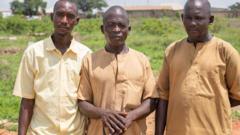The Abdullahi family of Kaduna, Nigeria, has devoted more than 50 years to the upkeep of Tudun Wada Cemetery, a sacred ground for the city's Muslim community. Until recently, their services — digging graves, washing corpses, and maintaining the expansive cemetery — were performed without formal remuneration, relying largely on the small donations from grieving families.
Established by city officials a century ago, the graveyard has become a fundamental aspect of the local culture. The family's involvement began in the 1970s when brothers Ibrahim and Adamu Abdullahi first took on the responsibility. Both are now buried within the cemetery, with their sons continuing the legacy. Magaji, 58, Ibrahim's eldest son, explains the family's commitment stems from their belief in divine reward for providing this essential service despite the lack of financial compensation.
Each day, the three full-time workers, including Magaji and his cousins Abdullahi, 50, and Aliyu, 40, start their shifts early to ensure they are ready whenever the call for a burial arises. Traditionally, Muslim funerals take place within hours of death, necessitating prompt action from the grave diggers. As such, preparations often begin with a phone call from a family member or local imam, followed by washing the body, preparing the grave, and managing the rites alongside mourners.
Over time, the Abdullahi family has worked through increasingly tense situations, including bouts of religious violence in Kaduna, where funerals were executed under significant stress and in chaotic circumstances. They have become integral to the grieving process, providing consolation and practical services to families in mourning.
Despite their significant contributions, the family has faced challenges in maintaining the cemetery, including a shortage of equipment and security issues, as well as little public funding or resources. Recently, however, the local council, led by newly appointed chairman Rayyan Hussain, has taken steps to formalize the family's role. Each of the five eldest members of the Abdullahi family has begun receiving a monthly salary, a welcome change, albeit still below the national minimum wage.
The council's chairman is also committed to improving the site with repairs, security enhancements, and establishment of facilities for body preparation. For the Abdullahi family, this official acknowledgment reinforces their role within the community, with hopes that one of Magaji’s children may follow in their footsteps, ensuring the continued nurturing of Kaduna's sacred burial grounds.
Established by city officials a century ago, the graveyard has become a fundamental aspect of the local culture. The family's involvement began in the 1970s when brothers Ibrahim and Adamu Abdullahi first took on the responsibility. Both are now buried within the cemetery, with their sons continuing the legacy. Magaji, 58, Ibrahim's eldest son, explains the family's commitment stems from their belief in divine reward for providing this essential service despite the lack of financial compensation.
Each day, the three full-time workers, including Magaji and his cousins Abdullahi, 50, and Aliyu, 40, start their shifts early to ensure they are ready whenever the call for a burial arises. Traditionally, Muslim funerals take place within hours of death, necessitating prompt action from the grave diggers. As such, preparations often begin with a phone call from a family member or local imam, followed by washing the body, preparing the grave, and managing the rites alongside mourners.
Over time, the Abdullahi family has worked through increasingly tense situations, including bouts of religious violence in Kaduna, where funerals were executed under significant stress and in chaotic circumstances. They have become integral to the grieving process, providing consolation and practical services to families in mourning.
Despite their significant contributions, the family has faced challenges in maintaining the cemetery, including a shortage of equipment and security issues, as well as little public funding or resources. Recently, however, the local council, led by newly appointed chairman Rayyan Hussain, has taken steps to formalize the family's role. Each of the five eldest members of the Abdullahi family has begun receiving a monthly salary, a welcome change, albeit still below the national minimum wage.
The council's chairman is also committed to improving the site with repairs, security enhancements, and establishment of facilities for body preparation. For the Abdullahi family, this official acknowledgment reinforces their role within the community, with hopes that one of Magaji’s children may follow in their footsteps, ensuring the continued nurturing of Kaduna's sacred burial grounds.





















